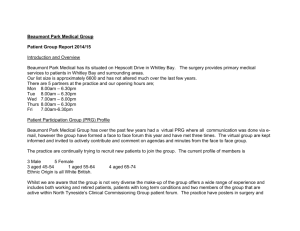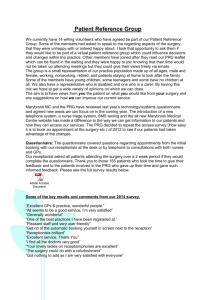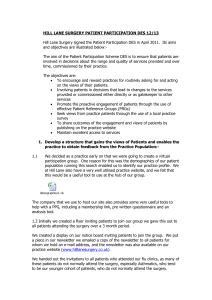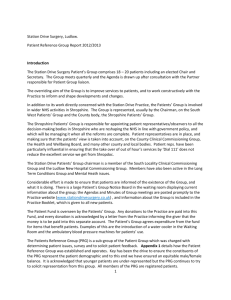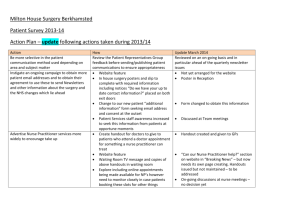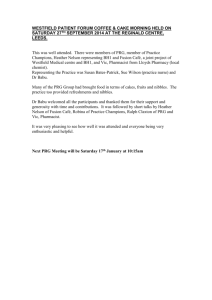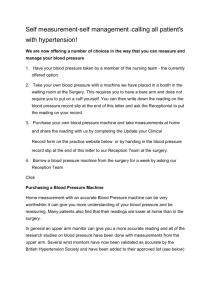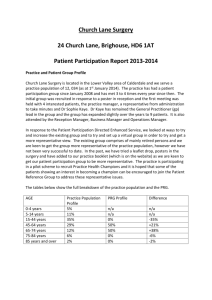Survey Report 2013/2014
advertisement
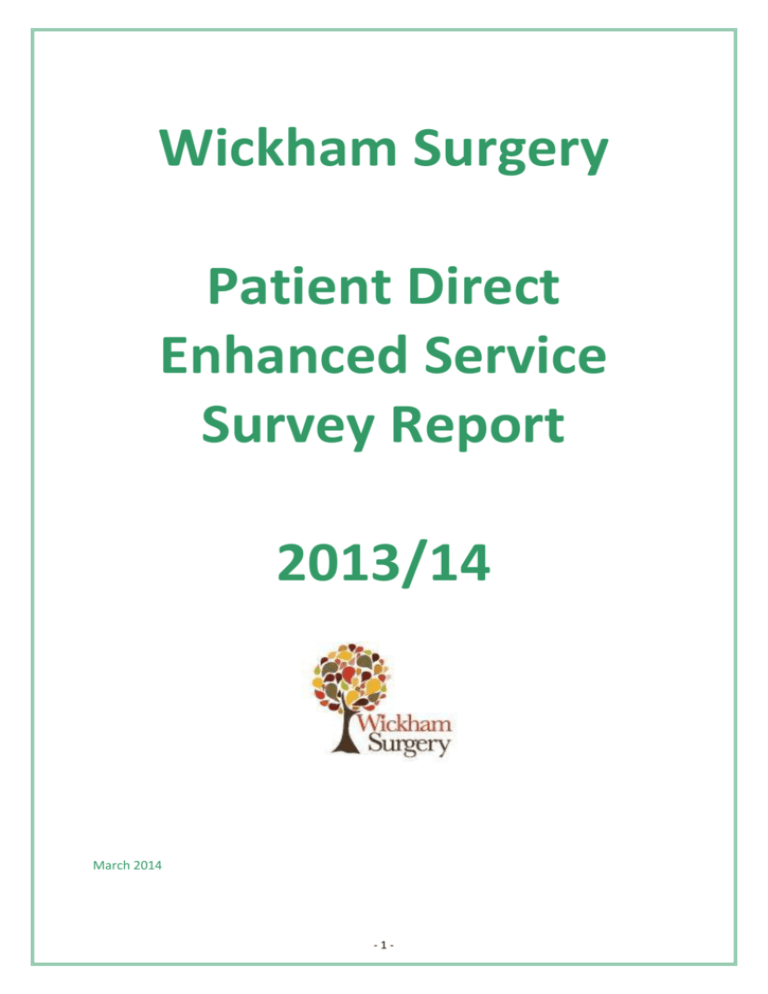
Wickham Surgery Patient Direct Enhanced Service Survey Report 2013/14 March 2014 -1- Wickham Surgery Patient Participation Scheme - March 2014 Introduction/Overview Wickham surgery will develop and carry out an annual survey with our patients where they will be invited to participate in a Patient Reference Group (PRG). This reference group will be a virtual group through the practice website. The practice profile was examined to ensure, as far as possible that a representative sample of the practice population will be included in the PRG group. Wickham Surgery has a patient population of 11819 patients (Jan 2014) We are a dispensing practice and dispense to 8500 of our patients. There are seven GPs and a salaried GP with a team of four practice nurses. Opening and Extended Hours. Our core hours are Monday to Friday 8am to 6:30 pm Extended Hours are for pre booked appointments and are as follows: Tuesdays until 7:30 pm Thursdays from 7:30am Saturday 8:30am to 12pm There is full reception and dispensary cover during these extended hours to enable patients to take advantage of these services in extended hours. Methodology The PRG group were asked to suggest key areas of priorities that require change or improvement in the surgery. A survey will be developed using these key areas in line with the National Survey recommendations of 50 questionnaires per GP. 400 questionnaires will be distributed through the website PRG and in the surgery for patients to complete online or face to face. The results will be collated and published through Wickham surgery website www.wickhamsurgery.co.uk and on the notice boards in the surgery, hard copies will also be distributed in the waiting areas. Patients who have agreed to participate in the PRG will be contacted by email and will be invited to make comment and agree on the action points of the report. This report will then be published on the Wickham surgery website www.wickhamsurgery.co.uk and NHS Choices website www.nhs.co.uk These requirements are with accordance with the Patient Participation Direct Enhanced Service Contract (DES) 13/14. There are six stages to this process which are outlined below: Develop a structure that gains the views of patients and enables the practice to obtain feedback from the practice population, e.g. PRG; Agree areas of priority with their PRG; Collate patient views through the use of a patient survey; Provide the PRG with an opportunity to discuss survey findings and reach agreement with the PRG on changes to services; Agree action plan with PRG and seek PRG agreement to implementing changes; Publicise the actions taken and subsequent achievement. Step 1. Develop a Structure for a PRG Group Wickham surgery developed a virtual patient reference group via their web site and in surgery from September 2011, forty five patient signed up to the first’ virtual’ PRG, fifty four in the second year and in total we have sixty patients signed up in 2014. -2- Patients were asked to participate by signing up on line or providing their email address so that the surgery could contact them with regard to their views through a survey and face to face. A letter inviting patients to join the group are put in all ‘new patient packs’ on the website and leaflets in the surgery. To ensure the practice PPG is represented of all registered patients, letters were sent to the three local care and nursing homes, the drug rehabilitation centre, voluntary Community Care organisations that transport the elderly or frail to the surgery or hospital appointments and Carers group who provide help and advise to carers in the community including adult and children who are carers. A representation of our practice population is shown below: Patient Population by Age 17 - 24 8% 1% 8% 25 - 34 11% 35 - 44 22% 45 - 54 20% 55 - 64 30% 65 - 74 Over 85 PRG Group by Age 17 - 24 21% 2% 4% 25 - 34 8% 35 - 44 17% 45 - 54 55 - 64 28% 20% 65 - 74 Over 85 -3- PRG Group By Sex 46% Male Female 54% Practice Population by Sex 49% 51% Male Female PRG Ethnicity 120 100 80 60 40 20 0 White British Mixed Asian or Black or Chinese Other Asian Black British British Series1 -4- Ethnicity By Practice Population 6000 5000 4000 3000 2000 1000 0 sh Iri k Bl ac kis ta ni he rn As ia n Ch in es e an Ot Pa In di iti In di a n/ br Br iti sh sh W hi te Series1 Patients were informed about the Patient Reference Group and survey in the following ways: Leaflets in reception A link on the website A message on the repeat prescription Surgery’s Notice Boards New Patient Packs Parish Magazines that is delivered to surrounding villages Letters to Care Homes & Drug Rehab Centres Notices in the Patient Information Books that are in the waiting room. Information was posted on notice boards in the Community Centre and in the surgery to invite patients to take part. A letter was published in the five surrounding Parish Magazines that are distributed to every household in the villages. Information is available in the Patient Information Books that are in all of the waiting areas at Wickham and the branch surgery at Droxford. Step 2. Agreed Areas of Priority From November 2013 emails were sent to the PRG group and letters were made available in the surgery inviting patient to list their three areas of priority that could be improved in the surgery. Voluntary groups and care homes were also asked to give their priorities of access or concerns regarding the surgery. 100 priority letters were distributed and these were collated and the top three areas were identified. The following suggestions were put forward by the PRG and patients: Car park surface – 3 Getting through on the telephone - 21 Approach road to the surgery, too narrow - 1 Out of Hours Service - 2 Difficulty in ordering through email for medication - 14 Waiting time on the phone - 11 Signs in the surgery - 6 More disabled parking – 1 Music in the waiting room -6 Clock in the waiting room - 2 The suggestions were collated and the top three that the PRG and patients nominated as requiring improvement were: 1. Getting through on the telephone/ waiting on the phone 2. Directional signs within the surgery 3. Music in the waiting room and health information These suggestions were agreed by the PRG. -5- Step 3. Collate the Views Through the Use of a Survey. A questionnaire was developed using the feedback and this formed the basis of the survey. We gave consideration of the comments that were made in this process to help formulate the questionnaire. Comments are listed below: ‘Signs are needed by the doctors rooms for the nurses’. ‘Unaware of different waiting areas.’ ‘No TV monitor in nurses area’ ‘Music or BBC new running in the waiting area’ ‘Long wait on the phone’ ‘Prescriptions by email are getting lost’. ‘Music – maybe a TV on mute e.g., news kids TV’ ‘No music please!’ ‘Difficult getting through on the phone when you just want to make an appointment’ ‘A clock in the waiting room’ 400 questionnaires were distributed. 345 were completed successfully. The questionnaires were distributed from the 1st Dec 2013 until mid January and they were made available in the following way: Members of the PRG were emailed to inform them that the survey was ready to complete Paper copies in the waiting rooms. Through a link on the website. Notices on surgery notice boards Findings - Appendix 1 Getting Through on the Telephone 1. The last time you contacted the surgery was it to? 93% To make an appointment 9% To request a prescription 2. What time did you contact the surgery? 52% Between 8am and 11am 30% Between 11am and 3pm 18% After 3pm 3. On that occasion did you have problems getting through on the phone? 83% No Problems 14% Sometimes a problem 3% Always a problem Comments: Please change message on phone before getting through on the phone. It could be shorter and still give the information for test results and prescriptions. Busy line at times Have to redial Better than it was! But still busy! 4. Do you use the website to order your prescriptions or request an appointment? 31% Yes 69% No Comments: Using the website is difficult and doesn’t seem to work properly. I tried but unsuccessful Find it difficult as you have to input your data. -6- 5. If you could order your prescription and/or make an appointment online, would you welcome this facility, 65% Yes 20% No 6% Other. Comments You often do not receive my email request The current system is sometimes difficult. I have to write in all my medication Signs in the Surgery 6. Are the signs in the main waiting area clear and directional? 95% Yes 5% No Comments: Could use a clock in the waiting area Sign needed at first entrance to GPs room Make the signs for toilets more obvious. Signs in directing to GP rooms not help Signs not helpful when directing to room 1. 7. If you use the self-check in is it clear where you need to sit to see a GP or Nurse? 91% Yes 9% No Comments: No TV monitor in nurse waiting area. Did not notice self check in! Could be clearer for nurses. Waited for ½ hour for nurse when told to wait in main waiting area instead of nurses waiting. Unaware of two waiting areas. Music and Health Information in the Waiting Areas. 8. Would you like to have background music in the main waiting area? 12% All of the time 22% Some of the time 66% No Music Comments: Music – No, maybe the news TV or kids TV on mute? Would rather have peace and quite 9. What other health information would you like to see? 95% No happy with information provided 5% Do not Know. No comment Conclusions Getting through on the telephone. It has become evident that the volume of calls into the practice has increased significantly as a result of moving to new premises and patients have expressed that they are unable ‘pass the surgery and pop in’ like they used to when the surgery was located at Station Rd. We actively encouraged patients to ring at specific times in the day for appointments and prescriptions and to use the website to order prescriptions. 83% of patients stated that they had no problems getting through on the phone the last time they rang and 14% stated that they had some problems. -7- 31% of patients use the current website to order their prescriptions but the comments made were that is was sometimes difficult and cumbersome and some patients gave up using it. 65% of patients would welcome the facility to order prescriptions through the website and make an appointment directly from their clinical records. Signs in the Surgery. The directional signage within the new surgery was deliberately kept to a minimum and patient flow throughout the surgery has been monitored over a period of time. Patients have made comments that there is confusion as to where they wait to see the nurse and this was evident in the list of priorities that patients were asked to complete. 95% of patients stated that the signage was clear but some comments were made that it was not clear where the patients had to wait to see a nurse. Music and Health Information in the Waiting Areas Patients highlighted this as a priority to have music in the waiting areas but 66% of patients when surveyed said they did not want any music in the waiting rooms. Some comments were made that a screen would be nice in the nurses waiting area and that 95% of patients were happy with the variety of health information that were on the screens and in the leaflet stands. In February 2014 the results were collated and the practice reflected on the findings. A primary report was made ready for the PRG to discuss and agree the following action points Actions for discussion with the PRG: 1. Improve the current system with online booking appointments and repeat prescriptions through the clinical system. 2. Improve signs in the waiting area 3. To reach a compromise on music and information in the waiting rooms. Step 4. Provide the PRG with an opportunity to discuss the survey findings and reach agreement with the PRG on changes to services In February 2014 the PRG were contacted by email to inform them that the primary report was available for them to look at and discuss the action points. They were invited to make comment by email to the surgery. Hard copies were also made available in the surgery for patients to read and a comment sheet was included for their response. Responses from the PRG ‘Pleased that two of my original comments have been highlighted!’ ‘No Music. Hooray! No one can put on music without offending others.’ ‘Good clear questions and results that gave a clear indication of the strength of feeling. I agree with the points made and pleased that patients can really have an input and make a difference.’ ‘The report is concise and to the point. I have no other comment to make ‘ The comments in the survey and the PRG responses were carefully considered. Step 5. Agree Action Plan with PRG and Seek Agreement to Changes. The conclusions and suggested action points were made available to the public throughout this process and the views and comments were given consideration at every stage. Agreed Action Plan Getting through on the telephone Based on the priorities and survey results the practice will be able to provide ‘Access’ to patients to book an appointment or request a prescription online directly through the clinical system. This will -8- help to reduce telephone calls to the practice and provide a more secure efficient system than the present system. We will achieve this by: 1. Using a secure website that links into the clinical system to access appointments and repeat prescriptions only. 2. Patients will be able to register for this service but will need to come into the surgery to get a username and password 3. Patients will be able to view routine appointments that are available on line and request their repeat prescription directly from their medical records. Timescale: Immediate Signs in the Surgery Based on the survey results we will improve the signs to the nurses. We will achieve this by: 1. Placing stands with directions for patients with a nurse appointment to sit in the nurse waiting area. 2. Add a message to the self check in and TV screens to advise patient to sit in the nurse’s area if they have an appointment with the nurse. 3. Add a message to the television screens. Timescale: 30th April 2014 Music and Health Information in the Waiting Area. Based on the survey results we will not provide continuous music in the waiting area. 1. We will have more health promotion with narrative, at times. 2. We will respect that patients are not well and at times appreciate quiet area whilst waiting to see a GP. Timescale: Immediate The were some very positive comments from the PRG and as a result the overwhelming support from the members of the PRG the action plan with timescales will be implemented. I agree with the action plan I do not agree with the action plan I do not agree and suggest the following Response % 100 0 0 Response Count 6 0 0 NB - Other comments were noted by the practice and consideration given to two patients who suggested a clock in the waiting room. This will also form part of the action points to be implemented as it was thought to be a very valid comment even though the screens have the time displayed not everyone can see it. Step 6. Publicise actions taken and subsequent achievement. The final report with the agreed action plan and timescales will be published on the website by 31st March 2014 for patients to view. Copies will also be made available in the waiting areas. The PRG members will be contacted to express our appreciation in contributing to this process throughout. The practice acknowledges that the PRG plays an important part in allowing patients to have a opportunity to suggest ideas and make recommendations that make a real difference to the way the -9- surgery operates. We are very grateful to all of those patients who have taken part in this years report in such a committed and positive way. This report will be submitted to the Wessex Area Team and published on behalf of the Practice By: Name: Dr A Carey GP Lead for the Patient Reference Group (PRG) Date: 26th March 2014. Appendix 1. Results of PPG survey 2013/14 1. The last time you contacted the surgery by phone was it to? 9% 1. Make an appointment 2. Request a prescription 91% 2. What time did you contact the surgery? 18% Between 8am to 11am Between 11am to 3pm 52% After 3pm 30% - 10 - 3. On that occasion, did you have problems getting through? 14% 3% No problems Sometimes a problem Always a problem 83% 4. Do you use the website for ordering/making an appoitment? 31% Yes No 69% 5. If you could order your prescription/make an appt through the clinical system would you do this? 6% Yes 29% No Do not use have access to a computer 65% - 11 - 6. Are the signs in the main waiting area clear and directional ? 8. If you use the self check in is it clear where you sit to see a GP or Nurse? 9% Yes No 91% 9. Would you like to have background music in the waiting room? 12% All of the time 22% Some of the time No Music, happy as it is. 66% What other information would you like to see? 5% No, happy with information provided. Other, see comments 95% - 12 -
